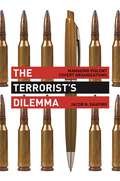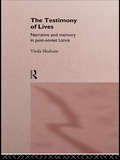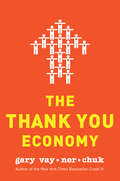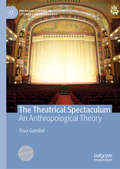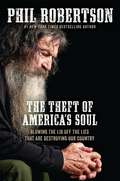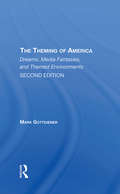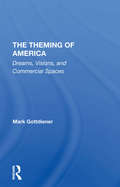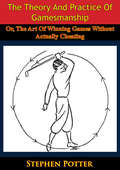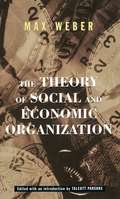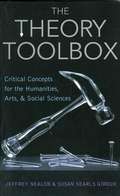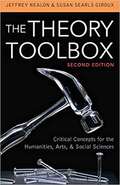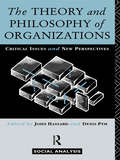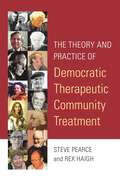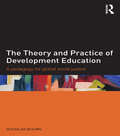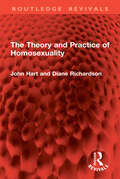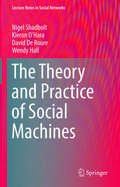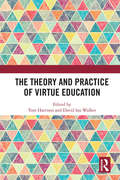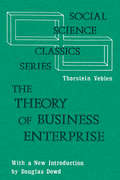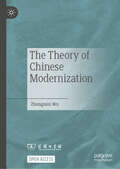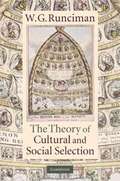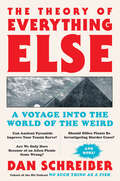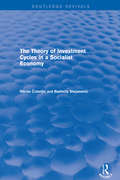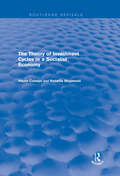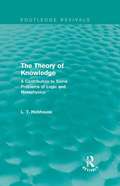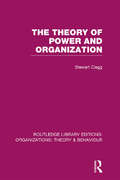- Table View
- List View
The Terrorist's Dilemma: Managing Violent Covert Organizations
by Jacob N. ShapiroA comprehensive look at how terrorist groups organize themselvesHow do terrorist groups control their members? Do the tools groups use to monitor their operatives and enforce discipline create security vulnerabilities that governments can exploit? The Terrorist's Dilemma is the first book to systematically examine the great variation in how terrorist groups are structured. Employing a broad range of agency theory, historical case studies, and terrorists' own internal documents, Jacob Shapiro provocatively discusses the core managerial challenges that terrorists face and illustrates how their political goals interact with the operational environment to push them to organize in particular ways.Shapiro provides a historically informed explanation for why some groups have little hierarchy, while others resemble miniature firms, complete with line charts and written disciplinary codes. Looking at groups in Africa, Asia, Europe, and North America, he highlights how consistent and widespread the terrorist's dilemma--balancing the desire to maintain control with the need for secrecy--has been since the 1880s. Through an analysis of more than a hundred terrorist autobiographies he shows how prevalent bureaucracy has been, and he utilizes a cache of internal documents from al-Qa'ida in Iraq to outline why this deadly group used so much paperwork to handle its people. Tracing the strategic interaction between terrorist leaders and their operatives, Shapiro closes with a series of comparative case studies, indicating that the differences in how groups in the same conflict approach their dilemmas are consistent with an agency theory perspective.The Terrorist's Dilemma demonstrates the management constraints inherent to terrorist groups and sheds light on specific organizational details that can be exploited to more efficiently combat terrorist activity.
The Testimony of Lives: Narrative and memory in post-Soviet Latvia
by Vieda SkultansVieda Skultans left Latvia as a refugee at the age of six months. In 1990, she returned for the first time. This text is both a personal account of a homecoming and an anthropology of a people trying to come to terms with its past and to face an uncertain future. Based on more than 100 interviews carried out in the wake of Latvian independence, it gives voice to stories of dispossession and exile and of ambiguous returns. At the same time it unpicks the process of memory itself, showing how personal memory is shaped by the traditional narratives of national history and culture.
The Thank You Economy
by Gary Vaynerchuk“Gary Vaynerchuk has seen the future of marketing. The Thank You Economy shows how it's built on both the time-honored techniques of listening to and appreciating customers and newer services like Twitter that allow you to engage directly with customers at unprecedented scale and speed. The book, like Gary, is also a lot of fun and full of passion.” —Dick Costolo, chief executive officer, TwitterGary Vaynerchuk, the New York Times bestselling author and creator of Wine Library TV, is back with a bold and expansive look at the evolution of today's marketplace, revealing the essential factors defining and driving successful relationships between businesses and consumers. In this groundbreaking follow-up to the bestselling Crush It!, Vaynerchuk—one of Bloomberg Businessweek’s “20 People Every Entrepreneur Should Follow”—looks beyond a numbers-based analysis to explore the value of social interactions in building our economy.
The Theatrical Spectaculum: An Anthropological Theory (Palgrave Studies in Literary Anthropology)
by Tova GamlielThis book offers a new mythic perspective on the secret of the allure and survival of a current-archaic institution—the Western theatre—in an era of diverse technological media. Central to the theory is the spectaculum—a stage “world” that mirrors a monotheistic cosmic order. Tova Gamliel here not only alerts the reader to the possibility of the spectaculum’s existence, but also illuminates its various structural dimensions: the cosmological, ritual, and sociological. Its cosmo-logical meaning is a Judeo-Christian monotheistic consciousness of non-randomness, an exemplary order of the world that the senses perceive. The ritual meaning denotes the centrality of the spectaculum, as the theatre repeatedly reenacts the mythical and paradigmatic event of Biblical revelation. Its social meaning concerns any charismatic social theory that is anchored in the epitomic structure of social sovereignty—stage and audience—that the Western theatre advances in an era characterized by hypermedia.
The Theft of America’s Soul: Blowing the Lid Off the Lies That Are Destroying Our Country
by Phil RobertsonIt’s time to take back what the devil has stolen and put God back into our culture.Phil Robertson, patriarch of A&E’s Duck Dynasty and one of the most recognized voices of conservative Christianity in America, believes that little by little, generation by generation, America has allowed the lines of morality, decency, and virtue to be erased. Our values have disappeared as we began to believe lies—such as that God is dead, truth is relative, and unity is impossible—that have brought discord, division and protest. But Phil also believes that things can change.Writing with captivating storytelling and unflinching honesty, Phil shows how to make America a God-honoring nation once more: by dropping the ten central lies that rule our day and taking up the ten truths that will bring peace of mind, harmony, and prosperity back to our country. The Theft of America’s Soul is a prophetic wake-up call for all who desire to see our nation thrive. And it is also an invitation to experience the life-giving, peace-filling, wholly-transforming love of God.
The Theming Of America, Second Edition: American Dreams, Media Fantasies, And Themed Environments
by Mark GottdienerThis book, an analysis of American society, explores the nature of social change since the 1960s as reflected in the "theming" of America from Graceland to Dollywood, from Las Vegas to Disneyworld, from the Mall of America to local mall.
The Theming Of America: Dreams, Visions, And Commercial Spaces
by Mark GottdienerMark Gottdiener explores the nature of social change as it has developed since the 1960s as reflected in the "theming" of America, from Graceland to Dollywood, from Las Vegas to Disney World, from the Mall of America to your local mall. Nowhere can modern Americans escape the profusion of recognizable symbols and signs attached to virtually every aspect of their culture constantly reminding them that they are on familiar and comforting grounds. "Just come in, friend, and buy; make yourself at home," these symbols seem to say, thus tying media culture and the seduction of consumerism to the production of ingeniously designed symbolic spaces. This is the first book to explore the origins, nature, and future of themed spaces in our information-overloaded world. Gottdiener begins with a brief historical account of the shifting importance of themes in the construction of built space. He then evaluates the economic basis for the increasing reliance on symbols in the marketing of commercial enterprises and analyzes contemporary trends in themed restaurants, malls, airports, theme parks, museums, and war memorials. Final chapters are devoted to examining such critical issues as the disappearance of public space, the relation between themes and mass media industries, and the future of symbolic spaces.
The Theory And Practice Of Gamesmanship; Or, The Art Of Winning Games Without Actually Cheating
by Stephen PotterGamesmanship as a civilised art is as old as the competitive spirit in man. It is polite psychological warfare. It is the moral equivalent of assault and battery. It is, as the subject of this book points out, The Art of Winning Games Without Actually Cheating. Anyone who has ever played any games for keeps has discovered the Gamesman either in himself or in an opponent. In its simplest terms the poker player’s bluff is a device of gamesmanship. While winning games without actually cheating may seem to some scrupulous sportmen to be treading the fair-play borderline, the author points out ‘The true Gamesman is always the Good Sportsman.’ If you find your game is slipping, whatever it might be-golf, tennis, bridge, poker, chess, craps or croquet-this is the book for you. Apply the power of the ‘ploy’ or, as we would say, the ‘Indian sign.’ After reading Gamesmanship you, too, can win without actually cheating.—Print Ed.
The Theory Of Social And Economic Organization
by Max WeberThis book is an introduction to Max Weber&’s ambitious comparative study of the sociological and institutional foundations of the modern economic and social order.In this work originally published in German in 1920, Weber discusses the analytical methods of sociology and, at the same time, presents a devastating critique of prevailing sociological theory and of its universalist, determinist underpinnings. None of Weber&’s other writings offers the reader such a grasp of his theories; none displays so clearly his erudition, the scope of his interests, and his analytical powers.
The Theory Toolbox: Critical Concepts For The Humanities, Arts, & Social Sciences (Culture and Politics Ser.)
by Jeffrey Nealon Susan GirouxThis text involves students in understanding and using the 'tools' of critical social and literary theory from the first day of class. It is an ideal first introduction before students encounter more difficult readings from critical and postmodern perspectives. Nealon and Giroux describe key concepts and illuminate each with an engaging inquiry that asks students to consider deeper and deeper questions. Written in students' own idiom, and drawing its examples from the social world, literature, popular culture, and advertising, The Theory Toolbox offers students the language and opportunity to theorize rather than positioning them to respond to theory as a reified history of various schools of thought. Clear and engaging, it avoids facile description, inviting students to struggle with ideas and the world by virtue of the book's relentless challenge to common assumptions and its appeal to common sense.
The Theory Toolbox: Critical Concepts For The Humanities, Arts, And Social Sciences
by Susan Searls Giroux Jeffrey NealonThis text involves students in understanding and using the "tools" of critical social and literary theory from the first day of class. It is an ideal first introduction before students encounter more difficult readings from critical and postmodern perspectives. Nealon and Searls Giroux describe key concepts and illuminate each with an engaging inquiry that asks students to consider deeper and deeper questions. Written in students' own idiom, and drawing its examples from the social world, literature, popular culture, and advertising, The Theory Toolbox offers students the language and opportunity to theorize rather than positioning them to respond to theory as a reified history of various schools of thought. Clear and engaging, it avoids facile description, inviting students to struggle with ideas and the world by virtue of the book's relentless challenge to common assumptions and its appeal to common sense. Updated throughout, the second edition of The Theory Toolbox includes a discussion of new media, as well as two new chapters on life and nature.
The Theory and Philosophy of Organizations: Critical Issues and New Perspectives
by John Hassard Denis PymThe Theory and Philosophy of Organizations makes a major contribution to the debate on the status of organizational theory as a discipline. The volume is divided into three sections exploring issues under the headings `theory', `anasis' and `philosophy'. In each, the limitations of `traditional' or `scientific' organizational paradigms are illuminated and new forms of interpretation offered.
The Theory and Practice of Democratic Therapeutic Community Treatment
by Rex Haigh Steve PearceDemocratic therapeutic communities have been set up all over the world, but until now there has not been a manual that sets out the underlying theories, and describes successful practice. Based on their own substantial experience and expertise, the authors of this new textbook explain how to set up and run modern therapeutic communities as effective evidence-based interventions for personality disorder and other common mental health conditions. Including detailed templates and practical information alongside a wider historical context, this encyclopaedic handbook will enable clinicians to develop and implement a democratic therapeutic community model with confidence. Highlighting the importance of belonging to a wider community, this book also shows how to ensure the needs of patients are considered and met, and that patients themselves can see in detail what this approach entails. This is an invaluable resource for clinicians and service commissioners working in the field of recovery from personality disorder, as well as those working in mental health and healthcare. This book also provides a useful model for professionals working in prisons and the justice system, long-term drug and alcohol rehabilitation and education, and students of group analytic, psychotherapy, and counselling courses.
The Theory and Practice of Development Education: A pedagogy for global social justice
by Douglas BournDevelopment education is much more than learning about development; it is a pedagogy for the globalised societies of the twenty-first century that incorporates discourses from critical pedagogy and postcolonialism, and a mechanism for ensuring that differing perspectives are reflected within education, particularly those from developing countries. Learning about development and global issues is now part of the school curriculum in a number of countries, and terms such as global citizenship, sustainable development and cultural understanding are commonplace in many educational contexts. Development education has been recognised as one of the educational discourses that has influenced the acceptance of these terms, for both policy-makers and practitioners. This ground-breaking volume addresses the history, theoretical influences, practices and impact of development education in Europe, North America, Australia and Japan. Chapters include how development education evolved, the influence of theorists such as Paulo Freire, the practices of aid and development agencies, and the impact of governments seeking evidence of public understanding of and engagement with development. The Theory and Practice of Development Education provides essential reading for anyone engaged in re-thinking and reflecting upon the educational needs of a globalised society, and seeking approaches towards learning that place social justice at the heart of that practice. It will be of particular interest to academics and postgraduate students in the fields of development education, international education and globalisation.
The Theory and Practice of Homosexuality (Routledge Revivals)
by John Hart Diane RichardsonFirst published in 1981 and now with a new preface by the renowned scholar Jeffrey Weeks, The Theory and Practice of Homosexuality discusses the way people who are homosexuals see themselves and are seen by others. It provides a conceptual framework to account for the development and maintenance of a homosexual identity in a politico-cultural context, with a minimizing of psychological and social pathology. The book is divided into three sections. Part one considers the major theoretical models relating to homosexuality. Part two explores identities and lifestyles, and part three presents the practical problems confronting homosexuals. A comprehensive and bold study, this volume will be a valuable read for students and researchers of sociology and LGBTQ+ studies.
The Theory and Practice of Social Machines (Lecture Notes in Social Networks)
by Wendy Hall Nigel Shadbolt Kieron O’Hara David De RoureSocial machines are a type of network connected by interactive digital devices made possible by the ubiquitous adoption of technologies such as the Internet, the smartphone, social media and the read/write World Wide Web, connecting people at scale to document situations, cooperate on tasks, exchange information, or even simply to play. Existing social processes may be scaled up, and new social processes enabled, to solve problems, augment reality, create new sources of value, and disrupt existing practice.This book considers what talents one would need to understand or build a social machine, describes the state of the art, and speculates on the future, from the perspective of the EPSRC project SOCIAM – The Theory and Practice of Social Machines. The aim is to develop a set of tools and techniques for investigating, constructing and facilitating social machines, to enable us to narrow down pragmatically what is becoming a wide space, by asking ‘when will it be valuable to use these methods on a sociotechnical system?’ The systems for which the use of these methods adds value are social machines in which there is rich person-to-person communication, and where a large proportion of the machine’s behaviour is constituted by human interaction.
The Theory and Practice of Virtue Education (Routledge Research in Character and Virtue Education)
by Tom Harrison David Ian WalkerThe Theory and Practice of Virtue Education offers the reader a comprehensive and authoritative account of both the theoretical and practical complexities of cultivating virtue in education and beyond. The book moves beyond the usual philosophical literature that merely discusses virtue in the abstract, and offers scholarly, research-informed suggestions for practice.Drawn from a highly successful international conference organised by the Jubilee Centre for Character and Virtues, the chapters in this volume offer a unique insight into the varieties of approaches that leading scholars have identified for putting the learning and nurturing of virtues into practice. Featured are chapters from internationally acclaimed scholars primarily in the fields of philosophy, psychology and education, which are categorised under three headings: philosophical and theoretical foundations for cultivating virtues; developing virtues in practice; and nurturing specific virtues. Beginning with chapters that examine differing theoretical complexities of virtue education, the book then moves on to explore different approaches to nurturing virtue in the classroom and beyond. This practical approach is further evidenced in the final section, where individual virtues are discussed.The Theory and Practice of Virtue Education highlights the theoretical complexity of putting virtue education into practice and, as a result, is of real use to researchers, academics and postgraduates in the fields of education, philosophy, psychology, sociology and theology. It should also be essential reading for educators in character and virtue.
The Theory of Business Enterprise
by Abraham EdelVeblen has been claimed and rejected both by sociologists and economists as being one of theirs. He enriched and attacked both disciplines, as he did so many others: philosophy, history, social psychology, politics, and linguistics. Because he took all knowledge as necessary and relevant to adequate understanding, Veblen was a holistic analyst of the social process.First published in 1904, this classic analysis of the U.S. economy has enduring value today. In it, Veblen posited a theory of business fluctuations and economic growth which included chronic depression and inflation. He predicted the socioeconomic changes that would occur as a result: militarism, imperialism, fascism, consumerism, and the development of the mass media as well as the corporate bureaucracy. Douglas Dowd's introduction places the volume within the traditions of both macroeconomics and microeconomics, tracing Veblen's place among social thinkers, and the place of this volume in the body of his work.
The Theory of Chinese Modernization
by Zhongmin WuThis open access book explores China's unique path to modernization, highlighting its journey from ancient civilization to modern society. It examines China's efforts from the mid-19th century's internal and external struggles to its contemporary economic achievements. The book covers historical, social, and economic aspects, emphasizing the balance between autonomous development and global integration. It explains how China has adapted and refined its modernization principles over time. The book is ideal for academics, researchers, and students in sociology, political science, and economics, as well as policymakers and professionals in international development. The content is accessible yet detailed, catering to both new and seasoned scholars. With insightful analysis and practical implications, the book is a significant contribution to the study of modernization and social development.
The Theory of Cultural and Social Selection
by W. G. RuncimanIn The Theory of Cultural and Social Selection, W. G. Runciman presents an original and wide-ranging account of the fundamental process by which human cultures and societies come to be of the different kinds that they are. Drawing on and extending recent advances in neo-Darwinian evolutionary theory, Runciman argues that collective human behaviour should be analyzed as the acting-out of information transmitted at the three separate but interacting levels of heritable variation and competitive selection - the biological, the cultural, and the social. The implications which this carries for a reformulation of the traditional agenda of comparative and historical sociology are explored with the help of selected examples, and located within the context of current debates about sociological theory and practice. The Theory of Cultural and Social Selection is a succinct and highly imaginative contribution to one of the great intellectual debates of our times, from one of the world's leading social theorists.
The Theory of Everything Else: A Voyage Into the World of the Weird
by Dan Schreiber"Absorbing. ... As thoughtfully written as it is nuts." —Chicago TribuneA collection of the world’s most mind-boggling, thought-provoking, and downright hilarious theories by the co-host of the hit podcast No Such Thing as a Fish, Dan Schreiber.Why are we here? Do ghosts exist? Will we ever travel back in time? Are we being visited by extraterrestrials? Will we ever talk to animals? Are we being told the truth? Are mysterious creatures roaming the Earth? And why, when you’re in the shower, does the shower curtain always billow in towards you?We don’t know the answers to any of these questions (that includes the shower-curtain one, which is a mystery that has eluded scientists for decades, and which they are still trying to solve). But don’t worry, no matter what questions you have, you can bet on the fact that there is someone (or something) out there, investigating it on your behalf—and Dan Schreiber collects their latest findings.From the Silicon Valley tech billionaires currently trying to work out whether or not the universe is one giant video game simulation to the self-proclaimed community of Italian time-travelers who are trying to save the world from destruction; The Theory of Everything Else will act as a handbook for those who want to think differently.
The Theory of Investment Cycles in a Socialist Economy
by Radmila Stojanovic Nikola CobeljicThis title was first published in 1968. Economic development and the system of the functioning of socialist economies have become the subject matter of an increasing number of works by economists throughout the world. Indeed, the experiences of socialist countries on different levels of social and economic development already offer a good deal of empirical material for theoretical analysis. An attempt at such an analysis has been made in this book, where the authors have concentrated on the investigation of a specific phenomenon in the motion of the economy — so-called investment cycles.
The Theory of Investment Cycles in a Socialist Economy
by Nikola CobeljicThis title was first published in 1968. Economic development and the system of the functioning of socialist economies have become the subject matter of an increasing number of works by economists throughout the world. Indeed, the experiences of socialist countries on different levels of social and economic development already offer a good deal of empirical material for theoretical analysis. An attempt at such an analysis has been made in this book, where the authors have concentrated on the investigation of a specific phenomenon in the motion of the economy — so-called investment cycles.
The Theory of Knowledge: A Contribution to Some Problems of Logic and Metaphysics (Routledge Revivals)
by L. T. HobhouseL. T. Hobhouse (1864-1929) was fundamental to the New Liberal movement of the late nineteenth and early twentieth century. He authored many important works in the fields of philosophy, economics and social liberalism. First published in 1896, The Theory of Knowledge considers the content and validity of knowledge, and the conditions on which our understanding of knowledge is based. It is a rich and important classic, which remains of value to students and academics with an interest in sociology, anthropology and the philosophy of logic.
The Theory of Power and Organization (Routledge Library Editions: Organizations)
by Stewart CleggIn this book the author develops a theory of power and organization, derived from a critical consideration of a literature extending across sociology, political science, philosophy and organization theory. The book raises and answers some of the issues which are important in the construction of a theoretical apparatus for the analysis of power and at the same time it proposes an alternative concept of organization, centred around the themes of power and control.
